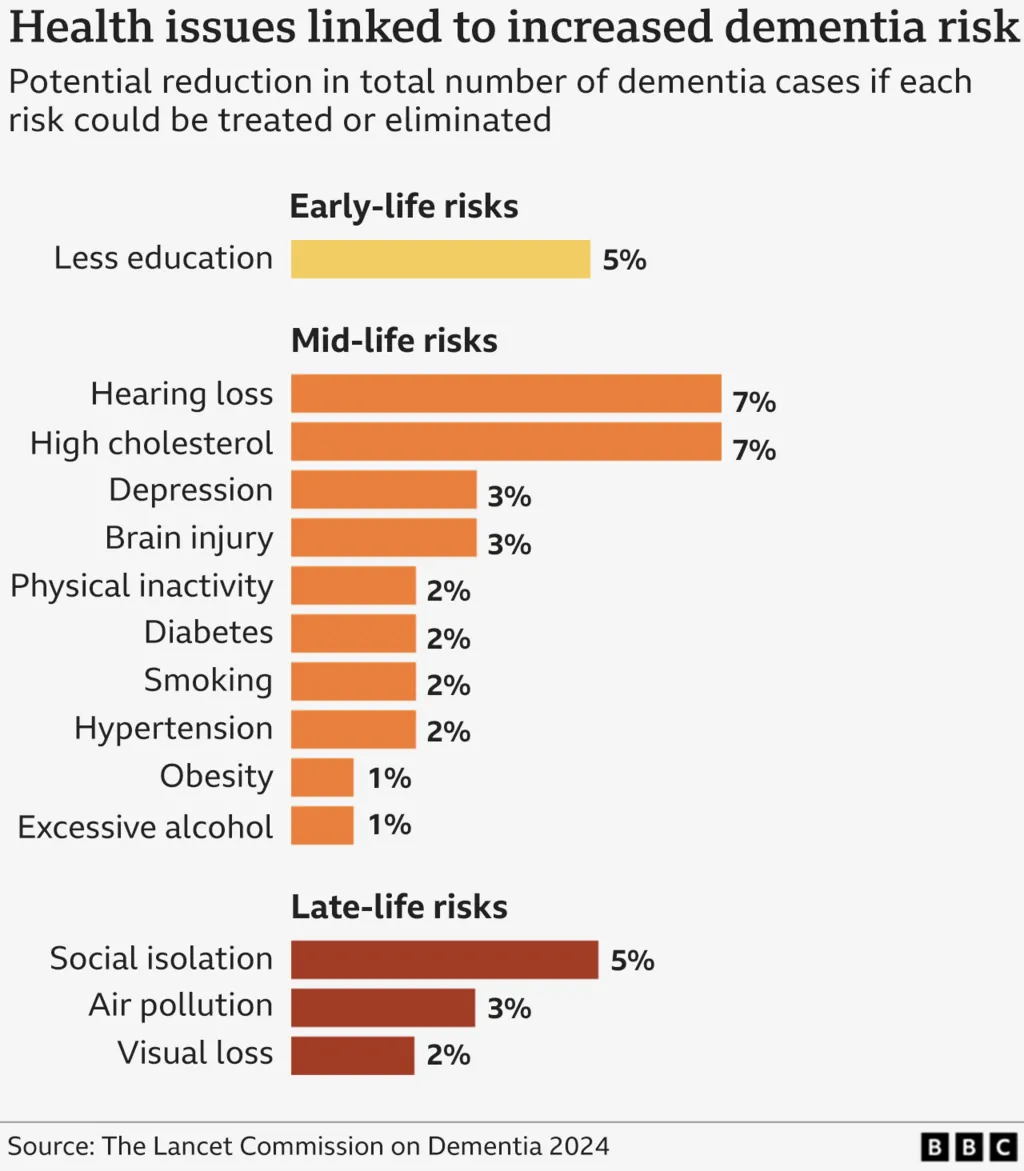Addressing poor vision and high cholesterol are two newly identified methods to reduce the risk of developing dementia, according to a significant report. Scientists have pinpointed 14 health conditions that, if managed or eradicated, could potentially prevent nearly half of all dementia cases globally.
The Lancet Commission’s latest report highlights that middle-aged individuals and those in poorer countries stand to benefit the most from addressing these risk factors.
The report also forecasts that the number of people living with dementia could more than double, reaching 153 million by 2050.

Dementia occurs when diseases like Alzheimer’s damage nerve cells in the brain, leading to confusion and memory loss. However, it is not an inevitable part of aging. While many factors contributing to dementia are beyond our control, such as inherited genes, international experts state that 45% of the risk can be modified and reduced.
“It’s never too early or too late to take action,” says lead author Prof. Gill Livingston from University College London. “Governments must reduce risk inequalities by making healthy lifestyles as achievable as possible for everyone.”
The researchers have outlined several recommendations for countries worldwide, including:
- Making hearing aids accessible for those with hearing loss
- Ensuring good-quality education for all
- Supporting people to quit smoking
- Encouraging exercise and sports
- Reducing high blood pressure from age 40
- Treating high cholesterol from mid-life
- Addressing obesity early in life
- Reducing excessive alcohol consumption
- Preventing social isolation and loneliness
- Screening for vision problems and providing glasses
- Reducing exposure to air pollution
Andy Watts, 58, from Berkshire, experienced his father’s Alzheimer’s diagnosis at age 64. His father passed away at 80.
“I watched my father slowly deteriorate over many years. In some ways, you lose them before you actually lose them, because their personality gradually fades,” Andy shares. Witnessing this “rips your heart out,” he adds.
With a family history of dementia and high cholesterol, Andy gets regular check-ups. He finds it “motivating” to know there are steps he and his family can take to minimize the risk of dementia, such as focusing on diet and exercise.
“I want to do everything I can to reduce the risk,” he says.
More Isolated
The report suggests that some factors pose a greater risk for dementia than others. For instance, it estimates that hearing loss and high cholesterol each account for 7% of preventable dementia cases. In early life, lack of education is a significant risk factor, while in later life, social isolation and poor vision become major concerns.
Some experts urge caution regarding the evidence. Prof. Tara Spires-Jones, director of the Centre for Discovery Brain Sciences at the University of Edinburgh, notes that this type of research cannot definitively link these factors directly to dementia. However, she acknowledges that it adds to the growing body of evidence suggesting that a healthy lifestyle “can boost brain resilience and prevent dementia.”
Prof. Charles Marshall from Queen Mary University London emphasizes that we should not imply that dementia could have been avoided with different lifestyle choices, as most of an individual’s risk is beyond their control.
Samantha Benham-Hermetz from Alzheimer’s Research UK describes the report’s findings as “groundbreaking.” She adds, “Many people think of dementia as something that happens later in life, but it is not an inevitable part of aging.”
How could vision loss be linked to dementia? Scientists aren’t entirely sure, but they suggest that in later life, it might be due to the brain shrinking as it no longer needs to process certain visual information. Vision loss can also “restrict people’s lives, making them go out less, become more isolated, and have fewer new experiences,” explains Prof. Livingston.
In many health systems, such as the NHS, impaired vision can be treated. However, this is more challenging in low-income countries that lack the same resources.
There are positive aspects to consider. Despite people living longer, there has been a reduction in dementia cases in high-income countries, likely due to lifestyle changes like fewer people smoking. However, rising life expectancy is increasing dementia cases in low-income countries.
“Twelve years ago, you would have said there’s nothing you can do about dementia – but that’s really not the case,” says Prof. Livingston.
